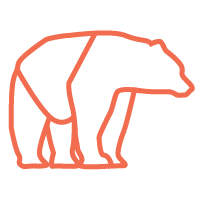
The power of the conscious consumer
Share
As your inboxes, social media and conversations are filled with ‘Black Friday’ deals, it's a fitting opportunity to reflect on the power you have as a consumer. Whether it’s your groceries or a winter coat, understanding the supply chain is crucial to ending discrete and damaging practices.
Earlier this year, the UK’s largest conservation organisations WWF-UK and the RSPB, produced a report called: Riskier Business: the UK’s Overseas Land Footprint to highlight the effect of the UK’s demand for beef & leather, cocoa, palm oil, pulp & paper, rubber, soy and timber. An area equivalent of 88% of the total UK land area was required to supply the demand of the aforementioned agricultural and forest commodities.
The expectation by consumers for international products year-round could be affecting 2800 species already threatened with extinction and accounting for 50% of deforestation across the globe. A snapshot of recommendations from the report can be seen below.

The COVID pandemic has highlighted how vulnerable our current global supply chains are AND how quickly our consumer habits can change - not always for good.
Prior to COVID, China produced approximately half of the world’s face masks. However, the spread of COVID throughout China meant the country was unable to export the necessary gear for the rest of the world. It’s possible this disruption created a situation in the UK, where doctors and medical staff (let alone members of the public), did not have adequate protective equipment during the peak of the pandemic.
Eventually, supply met the demand for protective equipment. People were protected but at the expense of the marine environment - masks and plastic shields have been found on 30% of UK beaches. Failure to promote reusable and washable protective gear has amplified the threats caused by plastic and single-use products on our marine life (eg. death by suffocation and entanglement) and our water supply (eg. presence of toxic chemicals).
As government restrictions across the globe encouraged more people to stay-at-home, spending at restaurants and hotels declined by more than 60% meaning millions of pounds of fresh goods destined for the hospitality industry ended up in the bin. On the other hand, research suggests our household food-waste decreased by 10% while we tried to become the next Jamie Oliver or Nigela Lawson overnight. Irrespective of altered food consumption behaviours during the pandemic, it appears employment and food prices are still the major factors in determining food waste. That is, employed people tend to produce more food waste because they can afford to.
Emerging research has modelled the effect of lockdown policies on supply chains. Analysis suggests the duration of lockdown (not necessarily the strictness of the policies) and number of affected countries, is the greatest driver of supply-chain losses. Does this mean we can blame lockdown policies for food waste and plastic in the oceans for example? No. Lockdown policies are designed to save lives.
It’s our current supply chains that are dangerous and unsustainable. It’s our demand for particular products and the legality of purchasing these products that has placed us in this position. VOX news videos on diets, coronavirus and human activities are helpful visuals on the impact of our purchase decisions.
Consumer behaviour needs to change and we need more people and policies to prioritise ethical and environmentally friendly products.
The power of conscious consumers cannot be underestimated. Here’s some previous examples:
- banning of animal fur used in luxury brands due to successful boycotts
- reduction of plastic packaging due to online petitions
- increased palm oil awareness due to face to face campaigns
- systemic changes for workers in Nike factories due to investigative journalism
Before you click ‘Buy’ this weekend - have a think about the product you’re buying and the company you're buying from. Are their prices transparent? Are they supporting local artisans and paying fair wages? Are they minimising and offsetting their carbon footprint?
Learn more about BearMade’s commitment to people and planet here.



